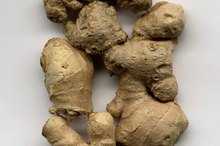What does fact checked mean?
At Healthfully, we strive to deliver objective content that is accurate and up-to-date. Our team periodically reviews articles in order to ensure content quality. The sources cited below consist of evidence from peer-reviewed journals, prominent medical organizations, academic associations, and government data.
- U.S. National Library of Medicine Medline Plus: Peptic Ulcer; George F. Longstreth, M.D.; August 2009
- Critical Reviews in Food Science and Nutrition: Capsaicin and Gastric Ulcers; M.N. Satyanarayana; 2006
- Critical Reviews in Food Science and Nutrition: Capsaicin and Gastric Ulcers; M.N. Satyanarayana; 2006
- Journal of Physiology, Paris: Capsaicin and the Stomach: A Review of Experimental and Clinical Data; O.M. Abdel-Salam et al.; May 1997
- Journal of Physiology, Paris: Capsaicin and the Stomach: A Review of Experimental and Clinical Data; O.M. Abdel-Salam et al.; May 1997
The information contained on this site is for informational purposes only, and should not be used as a substitute for the advice of a professional health care provider. Please check with the appropriate physician regarding health questions and concerns. Although we strive to deliver accurate and up-to-date information, no guarantee to that effect is made.
Can Cayenne Pepper Treat Peptic Ulcers?
The belief that spicy foods cause peptic ulcers is a pervasive myth. The majority of peptic ulcers stem from bacterial infections, according to Dr. George F. Longstreth of the Kaiser Permanente Medical Care Program in San Diego. Currently, the treatment for peptic ulcers includes medications that clear out the bacteria and decrease stomach acid. Capsaicin, the active ingredient in cayenne pepper, shows some promise in healing peptic ulcers. If you have a peptic ulcer, speak to your doctor or health-care provider about cayenne pepper as a potential cure.
If you are experiencing serious medical symptoms, seek emergency treatment immediately.
Causes
The main cause of peptic ulcers is Helicobacter pylori, or H.pylori, bacteria, according to the Mayo Clinic website. These bacteria are passed through food, water and close contact with an infected person. Overuse of nonsteroidal anti-inflammatory medications such as Advil and Motrin are another common cause of peptic ulcers. Less-common causes include smoking, chewing tobacco, excessive alcohol intake, radiation treatment and emotional stress.
- The main cause of peptic ulcers is Helicobacter pylori, or H.pylori, bacteria, according to the Mayo Clinic website.
- These bacteria are passed through food, water and close contact with an infected person.
Healing Properties
Herbs and Spices to Cure a Stomach Virus
Learn More
Capsaicin can promote healing of peptic ulcers, according to recent research. A 2006 review published in the journal “Critical Reviews in Food Science and Nutrition” reported that capsaicin slows the production of acid in the stomach; the spice boosts the production of alkali, which helps to neutralize stomach acid 3.** Capsaicin also stimulates blood flow to the stomach lining and enhances the release of mucus in the stomach, all of which aid in healing.
Capsaicin and H.Pylori
The capsaicin in cayenne pepper also actively combats Helicobacter pylori bacteria. A laboratory study conducted at Harran University School of Medicine in Turkey found that capsaicin demonstrated active anti-bacterial properties against strains of Helicobacter pylori that had developed resistance to the conventional antibiotics clarithromycin and metronidazole. The results of this study were published in 2005 the journal “Annals of Microbiology."
Caveat
Acidophilus & Gastritis
Learn More
An animal study at the Medical University of Pécs in Hungary found that capsaicin can repair damaged stomach lining and protect the colon. The review, published in 1997 in “Critical Reviews in Food Science and Nutrition,” employed some anecdotal cultural evidence to support the use of cayenne pepper to treat peptic ulcers, saying that peptic ulcers occur three times less often in cultures where large amounts of capsaicin are consumed 3. More studies, however, are needed. Seek medical clearance before you use cayenne pepper as a cure for a peptic ulcers.
- An animal study at the Medical University of Pécs in Hungary found that capsaicin can repair damaged stomach lining and protect the colon.
- The review, published in 1997 in “Critical Reviews in Food Science and Nutrition,” employed some anecdotal cultural evidence to support the use of cayenne pepper to treat peptic ulcers, saying that peptic ulcers occur three times less often in cultures where large amounts of capsaicin are consumed 3.
Related Articles
References
- U.S. National Library of Medicine Medline Plus: Peptic Ulcer; George F. Longstreth, M.D.; August 2009
- MayoClinic.com: Peptic Ulcer; January 2011
- Critical Reviews in Food Science and Nutrition: Capsaicin and Gastric Ulcers; M.N. Satyanarayana; 2006
- Journal of Physiology, Paris: Capsaicin and the Stomach: A Review of Experimental and Clinical Data; O.M. Abdel-Salam et al.; May 1997
- Ramakrishnan K, Salinas RC. Peptic ulcer disease. Am Fam Physician. 2007;76(7):1005-12.
- Vomero ND, Colpo E. Nutritional care in peptic ulcer. Arq Bras Cir Dig. 2014;27(4):298-302. doi:10.1590/S0102-67202014000400017016
- Canadian Society of Intestinal Research. Diet for Ulcer Disease.
- Mayo Clinic. Helicobacter Pylori (H. Pylori) Infection.
Resources
Writer Bio
Emma Cale has been writing professionally since 2000. Her work has appeared in “NOW Magazine,” “HOUR Magazine” and the “Globe and Mail.” Cale holds a Bachelor of Arts in English from the University of Windsor and advanced writing certificates from the Canadian Film Centre and the National Theatre School of Canada.









